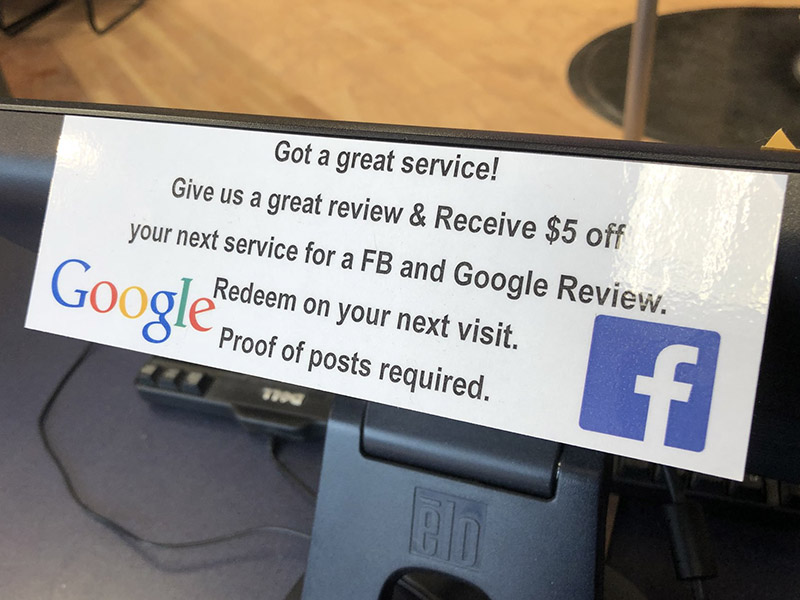Poorly run online review programs have been a topic we have covered from multiple angles over the years. Amazingly, many businesses are still ignorant, self-deluded or willfully not in compliance on Federal Trade Commission (FTC) laws and review programs.

With review authenticity in the news lately, a few big examples have popped into broad view. These cases provide guidance on how NOT to run your review program.
FTC Leverages Fines For Deceptive Reviews
It takes A LOT for the FTC to not only call a company out for online review violations but to actually offer up significant fines. For the second time in as many months the FTC has imposed monetary fines for cheating on reviews as LendEDU was fined for review deception.
LendEDU claimed on their loan comparison website that the ratings and rankings were objective and accurate. But it turned out that they were neither as the rankings were influenced by money and the ratings on their website and on TrustPilot were often done by employees or were fake all together. The punishment? LendEDU must pay a $350,000 fine and stop using fake reviews.

On TrustPilot as many as 123 of their 126 reviews were “written or made up by LendEDU employees or their family, friends, or other associates, and all of these manufactured reviews provided five-star ratings for the company.”
Apparently even Sophia Loren left a a glowing review as well. Not to worry, she was fake as was the review.
The takeaways from this case?
The bottom line in this case is if you accept money for placement on your website then it must be clearly noted for all to easily see that is the case and, obviously, your reviews must reflect the actual experience of your real customers and not be done by employees and their relatives.
In this case, the FTC makes it imminently clear what constitutes inappropriate reviews:
1) If the reviews don’t reflect the actual experience of the reviewers.
2) If there is an undisclosed material connection between the reviewer and advertiser – for example, if the reviewer is an employee, friend, or family member or if there are incentives involved.
3) If the advertiser fabricates reviews from whole cloth.
FTC Comes Down On Sharing Private Financial Details In Review Responses
In another recent settlement with Mount Diablo Lending the FTC again imposed significant fines. The mortgage broker agreed to pay $120,000 to settle Federal Trade Commission allegations.
Why did the FTC suddenly get so punitive? Mount Diablo Mortgage not only violated review guidelines, it violated the Fair Credit Reporting Act by revealing personal information about consumers in response to the negative reviews posted on Yelp.
Mount Diablo Lending posted consumer’s credit histories, debt-to-income ratios, taxes, health, sources of income, family relationships, and other personal information. According to the complaint several responses also revealed reviewers’ first and last names.
In response to one negative Yelp review, the company owner wrote: “Your credit report shows 4 late payments from the Capital One account, 1 late from Comenity Bank which is Pier 1, another late from Credit First Bank, 3 late payments from an account named SanMateo. Not to mention the mortgage lates. All of these late payments are having an enormous negative impact on your credit score.”
The takeaways from this case?
FTC can be punitive in certain circumstances. Historically that has been in cases where other laws were broken and the companies’ behaviors were over the top.
The FTC is also becoming more punitive in review cases. They were widely criticized last fall for not holding Sunday Riley more accountable for the fake reviews they had employees post.
Finally, you should note that if you handle private & confidential information about your customers, you should never divulge it in a review response. This is true for not just those in the financial industries but healthcare and legal industries as well.
PurpleBricks Canada Offered Employees Days Off For Made Up 5-Star Reviews
It never ceases to amaze me the many ways that companies attempt to get reviews and delude themselves into thinking that they are in compliance with TOS for the review platforms and the law.
Forbes recently reported on a case where PurpleBricks Canada, an online real estate brokerage, incentivized their employees to go out and ask friends and relatives to say good things about the company even if those friends/relatives had no experience with PurpleBricks.
The prize for the most reviews? A day off for the employee that garnered the most reviews.

In an email to employees, shared with Forbes by a former employee, PurpleBricks suggested:
“Here’s what you must not do: 1. Submit your own reviews (that includes using accounts under names other than your own). ‘Fake’ reviews would violate our terms of use agreements and could get us into hot water! 2. Ask clients for their reviews, as we have several client review incentive programs already running.”
By way of response to their be outed by Forbes, the company noted that the email, “though sent in good faith”, was “a complete one-off” and was “an error of judgement.” and that “we only offered this incentive once, in March 2019, and it generated only a handful of reviews,”
The takeaways of this case?
The world is now a very public place and discussing unethical and illegal behaviors in an email is a good way to get caught. This is similar to the Sunday Riley case where an employee posted the company’s inappropriate review request to Reddit.
It is also incumbant on everyone in the organization, but particularly the marketing staff, to understand the broad guidelines around the idea of self serving reviews from employees, relatives and their proxies. They are almost always against the guidelines of the platforms and against the law.
It was noted by PurpleBricks management in the email that “we have several client review incentive programs already running”. Thus it would seem that management’s response that it was a one off situation is false on its face and this leaves the company open to additional charges.
And in the world of lame PR defenses, I would suggest that the fact that the the company noted that program “generated only a handful of reviews” is not a defense at all but proof of additional guilt. This rationalization should go down as one of the worst PR responses ever. It’s like the car thief rationalizing the nature of his theft by saying “the car tank was almost empty when the car was stolen and I was only able to drive it a few miles.”
The Bottom Line On Review Incentives And Deception
It should also be clear from these cases, that the FTC is not the only review related hazard facing businesses these days. Consumers AND employees now have the ability to tarnish a companies image on a very large stage.
And in this very public world, respecting the rules around reviews can prevent both legal AND reputation issues at a massive scale.
While the cases above are from larger companies, it’s often small incentives from a small business to their customers … $5 off their next purchase, a free item or entry into a prize drawing… that cause these problems. No matter the size of the incentive or the business, all are still wrong in the eyes of the law and the review platforms when you compensate customers, employees or their friends for a Google review or any other review.

Here’s to hoping these stories and the others to come will help inform and deter future bad decisions on deception and incentives with reviews.

Comments are closed.